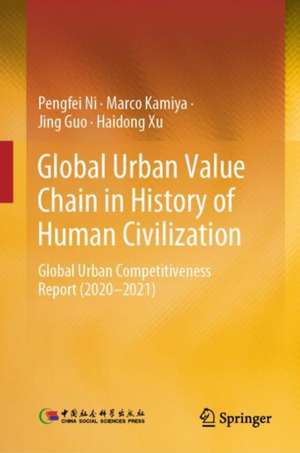Global Urban Value Chain in History of Human Civilization: Global Urban Competitiveness Report (2020–2021)
Autor Pengfei Ni, Marco Kamiya, Jing Guo, Haidong Xuen Limba Engleză Hardback – 4 oct 2024
Preț: 742.49 lei
Preț vechi: 905.47 lei
-18% Nou
Puncte Express: 1114
Preț estimativ în valută:
142.09€ • 154.29$ • 119.36£
142.09€ • 154.29$ • 119.36£
Carte tipărită la comandă
Livrare economică 22 aprilie-06 mai
Preluare comenzi: 021 569.72.76
Specificații
ISBN-13: 9789819714018
ISBN-10: 981971401X
Ilustrații: XX, 330 p.
Dimensiuni: 155 x 235 mm
Greutate: 0.87 kg
Ediția:2024
Editura: Springer Nature Singapore
Colecția Springer
Locul publicării:Singapore, Singapore
ISBN-10: 981971401X
Ilustrații: XX, 330 p.
Dimensiuni: 155 x 235 mm
Greutate: 0.87 kg
Ediția:2024
Editura: Springer Nature Singapore
Colecția Springer
Locul publicării:Singapore, Singapore
Cuprins
Global Urban Competitiveness Ranking.- Global Urban Value Chain in History of Human Civilization.- Themed Report: Urban Competitiveness and SDGs.- Progress in the Pursuit of Global Urban Sustainable Development Goals.- From the Perspective of Sustainable Urban Competitiveness.- Progress in the Implementation of Global Urban Sustainable Development.- From the Perspective of Sustainable Urban Competitiveness.- Case Analysis of Typical Cities with SDGs.- Global Urban Economic Competitiveness Report.- Global Urban Economic Competitiveness in 2020.- Analysis of Global Urban Economic Competitiveness in 2020.- Global Urban Sustainable Competitiveness Report.- Manifestation of Global Urban Sustainable Competitiveness in 2020.- Interpretation of Global Urban Sustainable Competitiveness.
Notă biografică
Mr. Pengfei Ni, Director of the Center for Cities and Competitiveness of the Chinese Academy of Social Sciences and Professor of the National Academy of Economic Strategy, is mainly researching urban development economics, real estate economics, competitiveness economics, and unified development economics. He was awarded the highest award in Chinese economics—Sun Yefang Economic Works Award in 2005.
Mr. Marco Kamiya, UNIDO Representative in Indonesia, Timor Leste, and ASEAN Affairs, was Chief of the Division of Digital Transformation and AI Strategies at UNIDO. When the current study was conducted, he was Chief of the Urban Economy and Finance Branch of the United Nations Human Settlements Programme, where he led global urban economy and financial studies and field projects. He is a senior member of the United Nations Economist Network (UNEN), and is affiliated with Cambridge University’s Industrial Innovation Policy (CIIP).
Mr. Marco Kamiya, UNIDO Representative in Indonesia, Timor Leste, and ASEAN Affairs, was Chief of the Division of Digital Transformation and AI Strategies at UNIDO. When the current study was conducted, he was Chief of the Urban Economy and Finance Branch of the United Nations Human Settlements Programme, where he led global urban economy and financial studies and field projects. He is a senior member of the United Nations Economist Network (UNEN), and is affiliated with Cambridge University’s Industrial Innovation Policy (CIIP).
Textul de pe ultima copertă
This study was designed and the book prepared by the National Academy of Economics Strategy of the Chinese Academy of Social Sciences (CASS) and the United Nations Human Settlements Programme. By applying the indicator system and objective data, it evaluates the competitiveness of 1006 cities around the world in detail, measures the development pattern of global city competitiveness as a whole, and discusses theoretical and practical issues in the development of a global city. The report proposes the key concept of the “global urban value chain” which runs through the history of human civilization. It provides a detailed study of the relationship between urban competition and SDG and analyzes Sustainable Development Goal 11 and typical cases to clarify which cities meet the Sustainable Development Goals. The annual competitiveness report provides a detailed analysis of the economic competitiveness, sustainable competitiveness, and distribution patterns of 9 sub-competitiveness of 1006 cities worldwide.
Caracteristici
Proposes the concept of urban value chain and observes human civilization through this unique perspective Builds a bridge between Urban Competitiveness and SDGs and illustrates the progress of SDGs in various cities Brings together a group of eminent scholars and researchers on the issue of urban development
